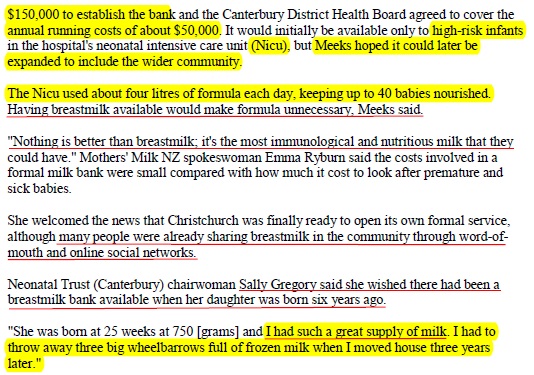On the basis of only one of my many previous posts on breast milk, you are all expecting me to clap my hands at New Zealand's first breast milk bank, and congratulate the team involved, right?
Well, no. I'm not clapping my hands. Here's why.
From the article:

To be spending $150,000 establishing a breast milk bank, and $50,000 - or a thousand dollars a week to run a breast milk bank, is a waste of resources primarily because:
1) as per .. the words by Sally Gregory - her baby was born at 25 weeks, and she had a ton of breastmilk which she landed up tossing out. Yet she says that she wished that there was a breast milk bank when her baby was born?
What did NICU do with the breast milk she had, after her baby was born?
Did they use formula, when they could have used her own breast milk?
2) Lots of mothers of babies in NICU (including myself) either feed their own babies, or express their own breast milk and it is given to their own baby. My surplus went to feed other babies.
Why is that not happening at Christchurch?
3) BUT....... The most important issue is something that the neonatologist, Dr Maggie Meeks has clearly missed out, which is right there in her own medical literature It's been known since 1980 that:
The breastmilk produced in a mother of a baby born at 25 weeks is completely different to the breast milk produced in a mother of a healthy baby born at term. The premie breastmilk has a completely different nutritional, immunological and hormonal profile, and premies have very different needs to a term baby.
The most recent medical review in February 2013 stated:
"Human milk from women delivering prematurely has more protein and higher levels of bioactive molecules.
Human milk must be fortified for premature infants to achieve adequate growth.
Mother's own milk improves growth and neurodevelopment, decreases the risk of necrotizing enterocolitis and late-onset sepsis, and should be the primary enteral diet for premature infants.
Donor milk is a resource for premature infants whose mothers are unable to provide an adequate supply of milk.
Challenges include the need for pasteurization, nutritional and biochemical deficiencies, and limited supply."
I repeat.... The breastmilk produced by a mother feeding a three month old baby is not adequate for a premie or term baby.
To use breastmilk from a mother feeding a term, or older baby, is deficient in very important ways.... compared to that produced by the mother of that PREMIE baby.
THEREFORE
4) The breastmilk needed by a premature baby should be coming from the mother of that baby.
Why would NICU be wanting to use breastmilk from the community which they will then pasteurise, and fortify because it does NOT have the nutrients that high risk premie babies need?
That is what Christchurch hospital should be using this money for - to educate mothers of premie babies as to WHY their breastmilk is the ONLY breastmilk appropriate for THEIR babies, and that it's their job to provide what only they can provide, as well as help supply extra for other premie babies.



